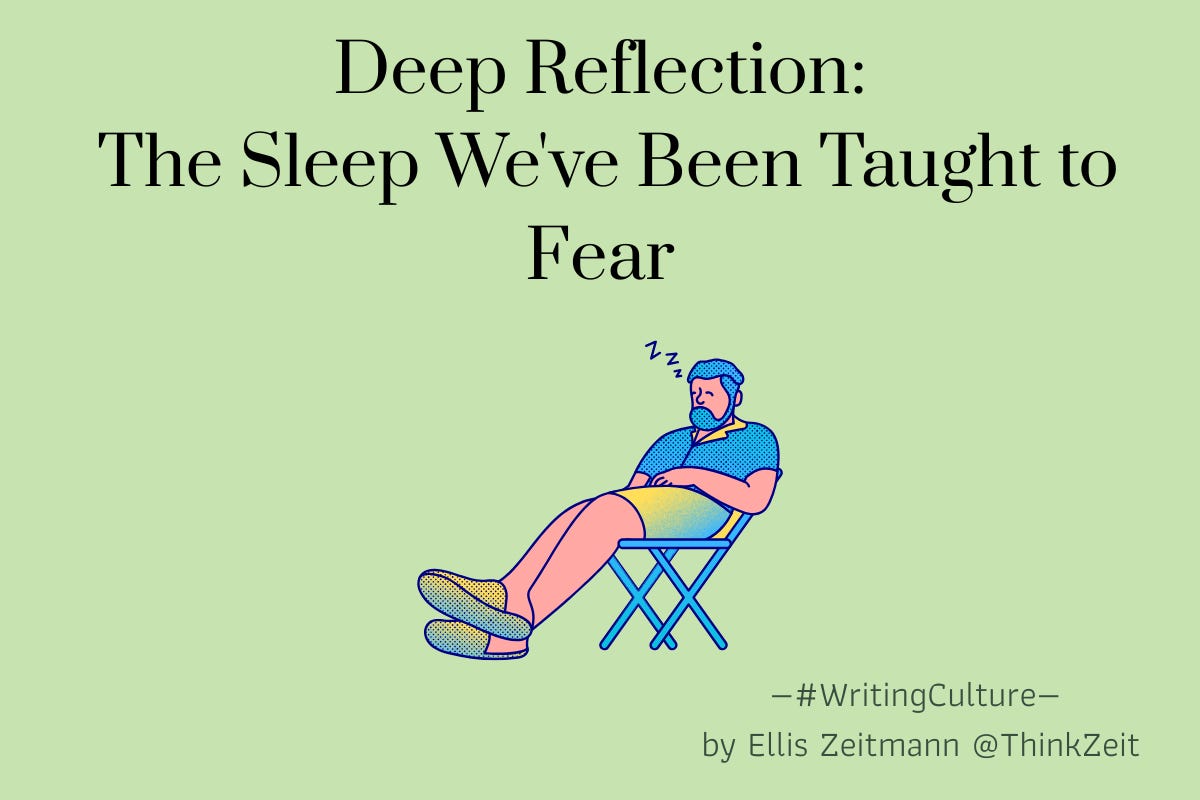Deep Reflection: The Sleep We've Been Taught to Fear #WritingCulture
A psychoanalytic and cultural meditation on rest, rhythm, and the quiet betrayal of the body

✒️ In 2012, Greece officially dismantled its national siesta policy.
A midday pause once woven into the sun's arc and the heart's pulse was now written out of law and silently out of legitimacy.
Within years, cardiovascular disease rose, especially among working men. The body noticed, even if policy didn't.
But let us not mistake this for a mere public health anecdote.
This is not about naps. This is about time. And who owns it.
Modernity has taught us to fear stillness. A nap is not merely inconvenient it is suspicious.
To rest in daylight is to appear idle, unfocused, undisciplined.
But this suspicion reveals the depth of our collective conditioning.
When we pause midday, we momentarily step outside the structured demands of productivity. We enter what might be called a pre-symbolic space a realm of experience before language, before duty, before the constant "ought" that drives our waking hours.
It is regression in the most vital sense a moment of unstructured self-contact.
Consider what happens in this space of rest. We aren't performing for others or maintaining appearances. We simply exist, momentarily freed from external expectation. In this quiet retreat, we're held by something deeper than social approval we're held by our own rhythm.
The nap becomes a transitional territory between our public and private selves. The carefully constructed persona we present to the world what psychoanalytic thinking might call our "False Self" momentarily dissolves, allowing the more authentic core of our being to breathe.
Yet in today's economy of performance, such moments of authentic retreat are increasingly rare. The dream-state is surveilled. And the rhythms of the body must bow to the ticking hand of capital.
The concept of chrononormativity the cultural expectation to align our bodies and desires with the mechanical clock has replaced seasonal wisdom with quarterly KPIs.
We no longer eat when we're hungry, sleep when we're tired, or pause when we're overwhelmed.
We wait for permission.
We wait for the weekend.
And even then, we scroll.
What happens to the need for rest when it is denied again and again?
It does not disappear. It descends.
It becomes part of our unexamined shadow those aspects of ourselves we've learned to hide, deny, or repress. Our longing for softness, surrender, and slowness doesn't vanish; it accumulates in the darkened corners of our psyche.
And so, fatigue surfaces not as a biological signal, but as an existential anxiety.
A haunting reminder of something sacred we abandoned.
The Greek siesta was not merely a tradition.
It was a counter-temporal act:
A refusal to obey a system that confuses productivity with purpose.
To nap at noon is not laziness. It is resistance.
A whispered reminder that not all time is billable. Not all motion is progress.
Cultural Critique
By stripping away collective rest, societies don't just extend the workday.
They erase the communal acknowledgment of limits.
Rest becomes shameful, internalized, privatized.
Exhaustion becomes pathology rather than policy failure.
When we lose our collective rituals that honor vulnerability and limitation, we lose the ability to hold complexity. Our relationship with rest polarizes either we're productive or we're failing, energetic or lazy. This splitting leaves no room for ambivalence, for the transitional mood that rest requires.
We become unable to see that both work and rest are necessary parts of a whole life not opposing forces, but complementary rhythms.
Existential Note
If we never pause, who are we beyond function?
If the only valid time is the time we sell, where is the self stored?
The siesta was never simply about sleep.
It was about recalibration of the body, the psyche, the soul.
A brief moment when society let the sun, not the boss, decide the schedule.
A Gentle Invitation
Perhaps it is time we reinstate more than a nap.
Perhaps it is time we reclaim the right to disappear into ourselves, not as a productivity hack, but as an act of quiet rebellion, even for twenty quiet minutes.
Before we forget what rest even felt like before our bodies must remind us through crisis what our schedules won't permit.
The Greeks knew this once. Our bodies still do.
Not every insight is productive. But some truths live best outside the algorithm in that pre symbolic space where the body remembers what culture tries to forget.
Consider this your permission slip for unauthorized timelessness.
—#WritingCulture— by Ellis Zeitmann for ThinkZeit
#WritingCulture #InkOfTheDay #DeepReflections #CreativeWriting #MythologyAndMeaning #ExistentialThinking #Psychoanalysis #CulturalCritique #CreativeThinking #SlowLiving #Rest #Chrononormativity #Psychoanalysis #Longevity


